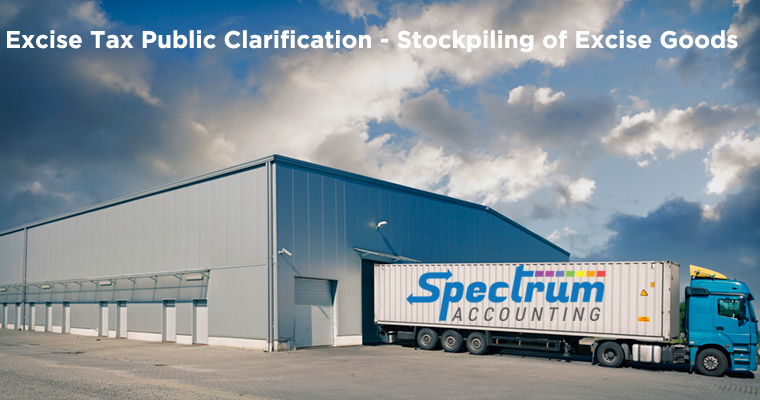This Public Clarification explains the Excise Tax obligations for stockpilers of sweetened drinks, electronic smoking devices and tools, or liquids used in such devices and tools, which are held for business purposes on the date Cabinet Decision No. 52 of 2019 on Excise Goods, Excise Tax Rates and the Methods of Calculating the Excise Price comes into effect i.e. 1 December 2019.
It also explains the Excise Tax obligations for stockpilers holding tobacco products on 1 December 2019, which have been subject to Excise Tax at a price lower than the minimum excise price introduced on such products by Cabinet Decision No. 55 of 2019 on the Excise Price for Tobacco Products.
Summary
Where a person expects to hold stock of sweetened drinks, electronic smoking devices and tools, or liquids used in such devices and tools for business purposes on 1 December 2019, the person should consider whether he would qualify as a stockpiler or not for Excise Tax purposes. Qualifying as a stockpiler will require the person to register for Excise Tax purposes with effect from 1 December 2019, and to pay Excise Tax on the stock on hand on 1 December 2019.
Similarly, where a person expects to hold stock of tobacco products on 1 December 2019 which have been subject to Excise Tax at a price below the minimum excise price, the person should consider whether he may qualify as a stockpiler in respect of these goods. Where a person does meet the provisions to be classified as a stockpiler, they will again have Excise Tax accounting obligations (and registration obligations, where not already registered) as a result.
Detailed Discussion
When are excise goods considered “stockpiled” in the UAE?
Excise goods are considered stockpiled in the UAE if the following conditions are met:
- The goods are held in free circulation in the UAE, intended to be sold in the course of business and Excise Tax on those goods has not been paid, remitted, relieved or deferred; and
- They are ‘excess’ excise goods.
Where excise goods meet the above conditions, they become subject to Excise Tax on the later of the date they are acquired by the stockpiler, the date an increase in tax obligation arose or the date the Decree-Law comes into force in respect of the relevant excise goods.
For example, the date the Decree-Law comes into force in respect of sweetened drinks, electronic smoking devices and tools and the liquids used in such devices and tools shall be the date that Cabinet Decision No. 52 of 2019 comes into effect, i.e. 1 December 2019.
The date an increase in tax obligation arises in respect of tobacco products shall be the date that Cabinet Decision No. 55 of 2019 comes into effect, i.e. 1 December 2019.
What are ‘excess’ excise goods?
Excise goods are considered to be excess excise goods if they meet all of the following conditions:
- The goods are owned by a person on 1 December 2019, i.e.:
- The date that Cabinet Decision No. 52 of 2019 comes into effect in respect of sweetened drinks, electronic smoking devices and tools and liquids used in such devices and tools;
- The date that Cabinet Decision No. 55 of 2019 comes into effect in respect of tobacco products.
- The goods are acquired by the stockpiler prior to the date above;
- The goods are intended to be sold by the person in the course of business; and
- The quantity of each type of excise good owned exceeds the average monthly stock level held by the person, based on the person’s average monthly stock holding level of that excise good. The average monthly stock holding is calculated by reference to the previous 12-month period prior to 1 December 2019 (i.e. 1 December 2018 to 30 November 2019). The average monthly stock level for the abovementioned period should be calculated in units, as the sum of the total number of units of stock of a particular product over the 12-month period, divided by 12. If on 1 December 2019 the quantity of any product exceeds the average monthly stock level of the person, any quantity of excise goods held over the average monthly stock level would be deemed as excess excise goods. As a result, the excess stock would be subject to Excise Tax.
- As an exception to the above, where the person holds a quantity of goods higher than two times the average monthly sales volume of excise goods (calculated by reference to the 12-month period prior to 1 December 2019 i.e. 1 December 2018 to 30 November 2019), then any volume of goods exceeding this value shall be considered excess excise goods and Excise Tax shall be due on the excess. This exception applies regardless of whether the volume of goods held is below the average monthly stock level outlined above.
Therefore, a business must perform two calculations:
– Calculation A – based on the average monthly stock holding level, and
– Calculation B – based on average monthly sales volume, in order to determine whether there is an ‘excess’ or ‘normal’ stockpile for Excise Tax purposes.
Where the stock held by a person on 1 December 2019 is considered ‘excess’ under either Calculation A or Calculation B, then Excise Tax shall be due based on that Calculation, and shall be calculated on that ‘excess’.
Where stock held by a person on 1 December 2019 is considered ‘excess’ under both Calculation A and Calculation B, Excise Tax shall be due and shall be calculated on the higher ‘excess’.
Note that this calculation must be performed on an individual product level, rather than on the overall category of excise goods. For example, this would apply to the stock of 500ml bottles of sweetened orange juice, and separately to the stock of 500ml bottles of sweetened apple juice, rather than on all sweetened drinks owned by the business as a whole.
Examples
Example (1)
The stockpiling calculation must be performed for each product held by a business on 1 December 2019 which would fall under the categories of sweetened drinks, electronic smoking devices and tools, and liquids used in such devices and tools.
Example stockpiling calculation relating to a sweetened drink
Juice LLC held 150 units of a specific Sweetened Drink each month from December 2018 – April 2019. From May 2019 onwards it held 200 units of this Sweetened Drink per month.
Juice LLC sold 50 units of the Sweetened Drink per month for 4 months of the year and 125 units per month for 8 months of the year.
On 1 December 2019, the business has 300 units >of the same Sweetened Drink on hand.
Calculation A:
Its average monthly stock holding for the period 1 December 2018 – 30 November 2019 is as follows:
150 units x 5 months = 750
200 units x 7 months = 1,400
> Average monthly stock level = (750 + 1,400) / 12 = 179 units
Calculation B:
During the period 1 December 2018 – 30 November 2019 Juice LLC sells:
50 x 4 = 200
125 x 8 = 1,000
> Average monthly sales volume = (200+1,000)/12 = 100 units
> Two times average monthly sales volume = 200 units.
The stock held on 1 December 2019 is then compared to the results of Calculation A and Calculation B:
>Calculation A : 300 units – 179 units = 121 units of excess excise goods
> Calculation B : 300 units – 200 units = 100 units of excess excise goods
Therefore, Excise Tax shall apply on the higher ‘excess’, which in this example is Calculation A, i.e. on 121 units.
Example (2)
As the stockpiling rules within the Excise Tax Executive Regulations also apply to circumstances where an increase in the tax obligation arises, businesses holding an existing stock of tobacco products on 1 December 2019 must assess whether any stockpiling obligations arise relating to the tobacco products held.
Businesses should, therefore, consider firstly whether the tobacco products held had Excise Tax paid on them based on a lower excise price than that specified by Cabinet Decision No. 55 of 2019 for the type of tobacco product held.
Where this is the case, they must then identify whether the tobacco products qualify as excess excise goods in line with the calculations outlined above. In such cases, the business will be considered a stockpiler and must account for Excise Tax on the new minimum excise price on 1 December 2019. Any Excise Tax previously paid in respect of the goods can be deducted when calculating the additional Excise Tax due to the FTA.
Detailed calculations must be kept as supporting evidence to support the fact the business has complied with its stockpiling obligations.
Example stockpiling calculation relating to the minimum excise price for tobacco products
Flame LLC held 1,000 units of a specific cigarette product between December 2018 – February 2019. From March 2019 onwards it held 1,200 units per month.
Flame LLC sold 900 units of the cigarettes per month for 6 months of the year and 1,000 units per month for 6 months of the year.
The cigarette product has an excise price of 6 AED per pack and Flame LLC has accounted for Excise Tax based on this price.
On 1 December 2019, the business has 2,200 units of the same cigarette product on hand.
Calculation A
average monthly stock holding for the period 1 December 2018 – 30 November 2019 is as follows:
1,000 units x 3 months = 3,000
1,200 units x 9 months = 10,800
> Average monthly stock level = (3,000 + 10,800) / 12 = 1,150 units
Calculation B
During the period 1 December 2018 – 30 November 2019 Flame LLC sells:
900 x 6 = 5,400
1,000 x 6 = 6,000
> Average monthly sales volume = (5,400+6,000)/ 12 = 950 units
> Two times average monthly sales volume = 1,900 units.
The stock held on 1 December 2019 is then compared to the results of Calculation A and
Calculation B:
> Calculation A : 2,200 units – 1,150 units = 1,050 units of excess excise goods
> Calculation B : 2,200 units – 1,900 units = 300 units of excess excise goods
Therefore, Excise Tax shall apply on the higher ‘excess’, which in this example is Calculation A, i.e. on 1,050 units.
As Flame LLC has already paid Excise Tax on the 1,050 units based on an excise price of 6 AED, it must now calculate the Excise Tax due based on the new minimum excise price.
In respect of cigarettes, the minimum excise price is 0.4 AED per cigarette. This is equal to 8 AED for a carton of 20 cigarettes.
Flame LLC must, therefore, pay additional Excise Tax based on the difference between the Excise Tax due on the new excise price, and the amount previously accounted for on the old excise price:
> 8 AED x 100% rate of tax x 1,050 units = 8,400 AED Excise Tax due
> 6 AED x 100% rate of tax x 1,050 units = 6,300 AED Excise Tax previously paid
> 8,400 – 6,300 = 2,100 AED additional Excise Tax payable.
Final Remarks
It should be noted that where a person holds stock for less than 12 months, the calculation should still be performed on the basis of a 12-month period
and any months without actual stock being held or sold should be included in the calculation with a value of ‘zero’.
As a result of the above, where the person has a ‘normal’ stock of excise goods on the date that both Cabinet Decision No. 52 of 2019 and Cabinet Decision No. 55 of 2019 comes into effect, the person will not be required to account for Excise Tax on the excise goods owned, and hence does not need to register as a stockpiler.
However, where a person has a ‘normal’ stockpile of excise goods and they charge and collect Excise Tax on the sale of such stock (e.g. in error), then the Excise Tax collected must be declared and paid via the respective Excise Tax return. Where such a person is not yet registered for Excise Tax purposes, they should also register.
If, by looking at all goods owned by a person, there are ‘excess’ excise goods of any product, on 1 December 2019 as outlined above, then the person will be considered to be a stockpiler and will be required to be registered by that date and account for Excise Tax on those goods.
Any amount of Excise Tax due under the stockpiling provisions must be declared within the ‘Stockpiling’ box in the Excise Tax return for the tax period covering December 2019. The figure declared within this box must be supportable with detailed records of the calculations which reconcile to the figure declared.
In addition to the above, in line with the provisions of the Excise Tax legislation, a person, in the course of conducting business, is required to keep audited records, showing the quantity of his stock of excise goods for the 12-months prior to 1 December 2019 for the purposes of ascertaining the stock of excise goods, regardless of whether the stock is considered ‘normal’ or ‘excess’.
This Public Clarification issued by the FTA is meant to clarify certain aspects related to the implementation of the Federal Law No 7 of 2017 on Tax Procedures, Federal Decree-Law No 7 of 2017 on Excise Tax and its Executive Regulations, Cabinet Decision No 52 of 2019 on Excise Goods, Excise Tax Rates and the Methods of Calculating the Excise Price and Cabinet Decision No 55 of 2019 on the Excise Price of Tobacco Products.
This Public Clarification states the position of the FTA and neither amends nor seeks to amend any provision of the aforementioned legislation. Therefore, it is effective as of the date of implementation of the relevant legislation, unless stated otherwise.



 contact us
contact us